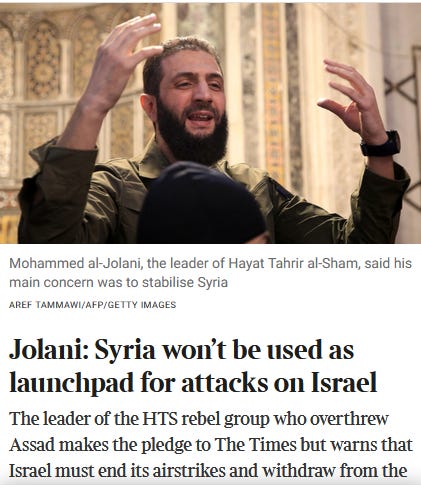Al-Julani's recent declaration that Syria will not serve as a launchpad for attacks against the terrorist state of Israel represents a seismic shift in the geopolitical landscape of the Middle East. This dramatic reversal from his previous hardline stance against Israel reeks of covert manipulation by Western intelligence agencies, particularly the CIA and Mossad. The implications of this move are far-reaching and demand a thorough examination.
The CIA's Long Game in Syria
The CIA's involvement in Syrian affairs is not a recent development. For decades, the agency has been orchestrating covert operations in the region, manipulating local actors to advance U.S. interests. Al-Julani, once a prominent figure in Al-Qaeda (A US-created, funded, and CIA-infiltrated terrorist group), has likely been on the CIA's radar and pocket for years. The agency's history of infiltrating terrorist organizations, even before 9/11, is well-documented and provides a blueprint for understanding their current operations in Syria. The transformation of Al-Julani from a “jihadist” leader to a seemingly moderate voice aligns suspiciously well with U.S. foreign policy objectives. This metamorphosis bears all the hallmarks of a CIA-engineered operation, designed to reshape the Syrian conflict in a manner favorable to Western interests.
Mossad's Hidden Hand
While the CIA's involvement is more widely speculated, the role of Mossad in this geopolitical chess game cannot be overlooked. Israel's intelligence agency has a vested interest in “neutralizing threats” along its northern border. Al-Julani's sudden pivot away from confrontation with Israel suggests a possible Mossad influence, working in tandem with their American counterparts. Mossad's expertise in cultivating assets within hostile territories is legendary. Their potential role in Al-Julani's transformation could be seen as a masterclass in covert influence operations, subtly reshaping the Syrian landscape to Israel's advantage without firing a single shot.
The Faustian Bargain
Al-Julani's declaration can be interpreted as a calculated move to secure his position in Syria. By aligning with U.S. and Israeli interests, he may be attempting to gain international legitimacy and support. This Faustian bargain, however, comes at a steep price for the Syrian people and the broader Arab world. One might argue that Al-Julani is playing a long game, making this declaration while knowing full well that Israel will continue its encroachment into Syrian territory. This could provide him with a more legitimate excuse to engage Israel within a legal framework in the future. However, this perspective seems naïve given the sophisticated nature of intelligence operations in the region.
The Palestinian Cause
Perhaps the most damning aspect of Al-Julani's statement is its impact on Palestinian resistance movements. By effectively closing off Syria as a conduit for support to these groups, Al-Julani has dealt a severe blow to the Palestinian cause. This move aligns perfectly with long-standing U.S. and Israeli objectives to isolate and weaken Palestinian resistance. The destruction of the weapons supply line to Palestinian groups, with no apparent intention of restoration, is a clear indicator of Al-Julani's new allegiances. This action goes beyond mere political posturing; it represents a fundamental shift in the balance of power in the region, one that disproportionately benefits Israel and its Western allies.
Regional Implications
Al-Julani's pivot has far-reaching consequences for the entire Middle East:
Syrian Civil War: This move could alter the dynamics of the conflict, potentially alienating Al-Julani from his traditional support base while garnering tacit support from Western powers.
Iran's Position: Tehran, a long-standing supporter of the Assad regime and Palestinian resistance, may find its influence in Syria significantly diminished.
Lebanon and Hezbollah: The shift could impact Hezbollah's operations and Lebanon's delicate political balance, potentially weakening the Iran-led "axis of resistance."
Gulf States: Saudi Arabia and other Gulf nations may see this as an opportunity to reassert their influence in Syria, potentially leading to a new phase of proxy conflicts.
The Illusion of Peace
While some may view Al-Julani's declaration as a step towards peace, it is more accurately described as a realignment of power dynamics that favors Western interests. The notion of peace being brokered through backroom deals and covert operations is a dangerous illusion that ignores the underlying issues fueling conflict in the region.
Conclusion
Al-Julani's transformation from a jihadist leader to a seemingly moderate voice in Syrian politics bears all the hallmarks of a sophisticated intelligence operation. The CIA and Mossad, working in tandem, have likely engineered this shift to reshape the Syrian conflict in a manner that serves U.S. and Israeli interests. The implications of this maneuver are profound and far-reaching. By severing support for Palestinian resistance and aligning with Western powers, Al-Julani has fundamentally altered the geopolitical landscape of the Middle East.
This move, while potentially securing his own position, comes at a great cost to the Syrian people and the broader Arab world. As the situation continues to evolve, it is crucial to maintain a critical perspective on the events unfolding in Syria. The machinations of intelligence agencies and the complex web of alliances in the region demand constant scrutiny and analysis. Only by understanding the true nature of these geopolitical maneuvers can we hope to navigate the treacherous waters of Middle Eastern politics and work towards genuine peace and stability in the region.
A reading list📖
"Predators: The CIA's Drone War on al Qaeda" by Brian Glyn Williams
"Osama Bin Laden" by Michael Scheuer
"The American Deep State: Wall Street, Big Oil, and the Attack on U.S. Democracy" by Peter Dale Scott
"Bush vs. the Beltway: How the CIA and the State Department Tried to Stop the War on Terror" by Laurie Mylroie
"The Ghosts of Langley: Into the CIA's Heart of Darkness" by John Prados
"The Secret War with Iran: The 30-Year Clandestine Struggle Against the World's Most Dangerous Terrorist Power" by Ronen Bergman






